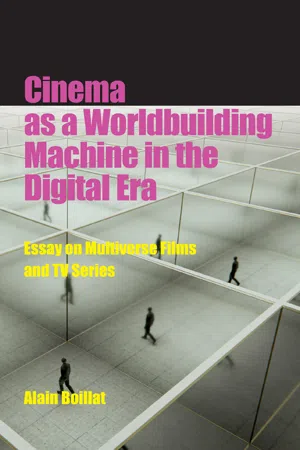
Cinema as a Worldbuilding Machine in the Digital Era
Essay on Multiverse Films and TV Series
- 350 pages
- English
- ePUB (mobile friendly)
- Available on iOS & Android
Cinema as a Worldbuilding Machine in the Digital Era
Essay on Multiverse Films and TV Series
About this book
This essay examines the primacy of worldbuilding in the age of CGI, transmedia practices and "high concept" fiction by studying the principles that govern the creation of a multiverse in a wide range of film and TV productions. Emphasis is placed on Hollywood sci-fi movies and their on-screen representation of imaginary machines that mirror the film medium, following in the tradition of Philip K. Dick's writings and the cyberpunk culture. A typology of worlds is established, as well as a number of analytical tools for assessing the impact of the coexistence of two or more worlds on the narrative structure, the style (uses of color, editing practices), the generic affiliation (or hybridity), the seriality and the discourse produced by a given film (particularly in fictions linked to post-9/11 fantasies). Among the various titles examined, the reader is offered a detailed analysis of the Resident Evil film series, Total Recall and its remake, Dark City, the Matrix trilogy, Avatar, Source Code and other time-loop films, TRON and its sequel, Christopher Nolan's Tenet, and several TV shows – most notably HBO's Westworld, but also Sliders, Lost, Fringe and Counterpart.
Frequently asked questions
- Essential is ideal for learners and professionals who enjoy exploring a wide range of subjects. Access the Essential Library with 800,000+ trusted titles and best-sellers across business, personal growth, and the humanities. Includes unlimited reading time and Standard Read Aloud voice.
- Complete: Perfect for advanced learners and researchers needing full, unrestricted access. Unlock 1.4M+ books across hundreds of subjects, including academic and specialized titles. The Complete Plan also includes advanced features like Premium Read Aloud and Research Assistant.
Please note we cannot support devices running on iOS 13 and Android 7 or earlier. Learn more about using the app.
Information
Table of contents
- Cover
- Dedication
- Title Page
- Copyright
- Contents
- List of Illustrations
- Acknowledgments
- Foreword
- Chapter 1: Worldbuilding in the Age of Digital (Trans)Media
- Chapter 2: Immersive Sci-fi Machines: Worlds, Genres, and Seriality
- Chapter 3: Film Diegesis and Multiverse
- Chapter 4: Worldbuilding and Film Style
- Chapter 5: Cyberspace: The Simulated World of the “Matrix”
- Conclusion
- Color Plates
- Bibliography
- Index of Films and TV Series